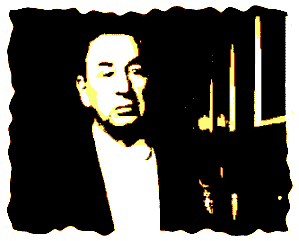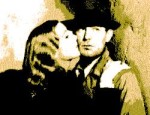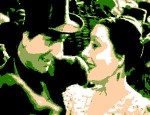Film Review
Despite being a tad overwritten and somewhat marred by some cliché-prone mise-en-scène,
Le Roi de Paris is a respectable first feature
from director Dominique Maillet, a film that regales us with the high production standards
we have come to expect of a quality French period drama in recent years.
In a made-to-measure principal role, Philippe Noiret gives another
of his standout performances, one that alternates wildly between bellicose excess and introspective
quietude with no apparent lack of continuity. Although dwarfed by
Noiret's stature, his co-stars, Veronika Varga and Manuel Blanc manage
to make their presence felt and leave us in little doubt that they both
have a promising career ahead of them.
Whilst the film essentially boils down to just another love-triangle melodrama, Maillet's
deft treatment of his subject, coupled with Noiret's performance, makes it something
more substantial. Rather like François Truffaut's
Le Dernier metro (1980), which the film
occasionally resembles,
Le Roi de Paris serves
as a passionate tribute to the theatre of a bygone age (here the 1930s), accurately
portraying the world of the stage and the colourful, mercurial characters that inhabited it.
Self-indulgence is perhaps carried a little too far with the multitude of
arcane references to theatre, plays and cinema of the time, most of which will doubtless pass right over
the heads of all but a few spectators. The threat which cinema posed to theatre
is shoehorned into the film, but, again, this is something which could, and perhaps should,
have been omitted as it adds nothing of substance to the narrative and merely
provides an unwelcome distraction. These shortcomings aside,
Le
Roi de Paris is an engaging film that is amply redeemed by the quality
of the performances. It would be seven years before Maillet made his next film,
La Mémoire dans la chair (2012).
© James Travers 2004
The above content is owned by frenchfilms.org and must not be copied.
Film Synopsis
In the 1930s, Victor Derval is the most admired stage actor in Paris. One night,
he is accosted by a young Hungarian woman, Lisa Lanska. Victor is so moved
by her evident enthusiasm for the theatre that he gives her a job as his personal assistant.
When she has settled into his home, Victor realises he is in love with her, but so is
his son Paul, a hot-headed young writer with revolutionary ideals. The playwright
Romain Coste also falls for Lisa's charms and creates a part for her in his next
play. Bitterly jealous of his father, Paul stages a drama of his own…
© James Travers
The above content is owned by frenchfilms.org and must not be copied.



